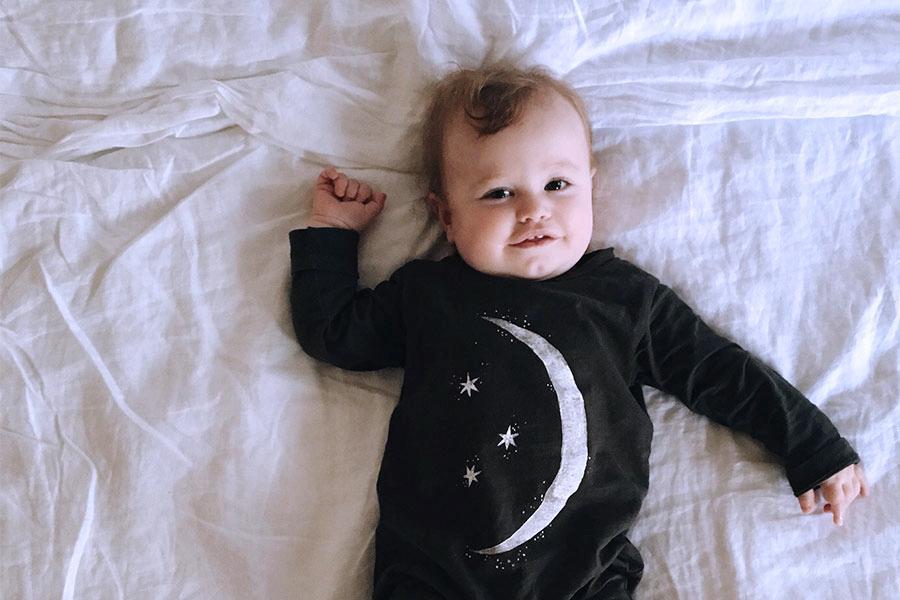TODDLER
3 Big Reasons Your Toddler Awakens at Night
How to keep your little one fast asleep.

Written by
Dr. Harvey Karp

Toddler Wakes Up At Night
Every 60 minutes—throughout the night—your child enters the light/drowsy part of her sleep cycle. That is when little commotions can cause your toddler to awaken. These disturbances can sneak into her mind from the outside world or they can originate from deep inside her body.
And like the Princess and the Pea, when your sweetie is in light sleep, it takes little—scratchy sheets, a ticking clock, the smell of new furniture, the hall light, a siren down the street—to nudge her from dozing to drama.
So, get rid of as many outside distractions as you can and crank up the white noise to cover intruding sounds and other distractions you cannot block. But if the night awakening continues, you will want to focus on some disturbances that might be prodding her awake from inside her body.
1. Teething is a Cause of Toddler Night Awakening
When those toddler canines and molars come in, it can be miserable. Like a headache, teething is typically easy to ignore in the daytime but can really throb at night, awakening toddlers.
What to Do If Toddler Night Awakenings Are Caused By Teething?
If you suspect teething is causing the night awakenings, first use a rougher white noise (as loud as a shower) to distract your little angel from her swollen gums. (If you have not used white noise recently, start it slowly). Also, ask your health-care provider about using acetaminophen or ibuprofen half an hour before bedtime.
An Old-School Teething Remedy to Help With Night Wakings
An old-time teething remedy is to dip the corner of a thin washcloth in apple juice and freeze it. Then let your child chew on the frozen cloth.
2. Hard Poo and Digestive Woes Can Cause Night Waking
Constipation can make kids grumpy and miserable. And when your child’s intestines strain to expel a hard stool at night, it can awaken him.
What to Do If Poo and Digestion is Causing Night Wakings
If you think your sweetie has a poo problem, make sure he gets plenty of exercise and water and ask your healthcare provider for dietary recommendations, like reducing constipating foods (bread, dairy, rice, pasta and fried food) and boosting high-fiber foods (vegetables, beans, dried fruit, and juices like prune, carrot or aloe vera).
3. Dry Throat and Stuffy Nose Can Cause Toddler Night Awakenings
Little kids get lots of colds. So, you can be sure your toddler will occasionally have sleep troubles because of a scratchy throat or stuffy nose. (Both problems are especially common in high altitudes and desert climates, or when you are running the heater on cold winter nights.)
When that happens to your child, place a folded towel under the mattress to raise the head of the bed (unfortunately this does not work well if your toddler flips all around during sleep) and run a cool mist humidifier all night. Use only distilled water, and clean the humidifier every day to prevent bacterial growth.
Warning: Avoid using a hot water vaporiser. It can burn your child if he touches the steam.
Try a little squirt of pure saline spray—available over the counter in any chemist’s—in each nostril. Also, soothe a cough with a syrup made with a few tablespoons of warm water mixed with a little honey and lemon juice (lemon juice has natural decongestants). One study of over 100 children found that honey was more effective than dextromethorphan (the key ingredient medicines like Robitussin) for night cough.
If a cough persists or is spasmodic or wheezy, ask your healthcare provider about asthma. And if your child snores or sleeps with his neck extended, ask your healthcare provider if sleep-disordered breathing (SDB) might be the culprit.
Final Thoughts: Toddler Night Awakenings
If none of the above are causing your toddler’s night awakenings, and you suspect it might be confusional arousal or night terrors, then make sure to read these tips for dealing with confusional arousal and setting bedtime routines.
Disclaimer: The information on our site is NOT medical advice for any specific person or condition. It is only meant as general information. If you have any medical questions and concerns about your child or yourself, please contact your health provider. Breastmilk is the best source of nutrition for babies. It is important that, in preparation for and during breastfeeding, mothers eat a healthy, balanced diet. Combined breast- and bottle-feeding in the first weeks of life may reduce the supply of a mother's breastmilk and reversing the decision not to breastfeed is difficult. If you do decide to use infant formula, you should follow instructions carefully.
SHARE THIS ARTICLE
PARENT PICKS
Bestsellers



















